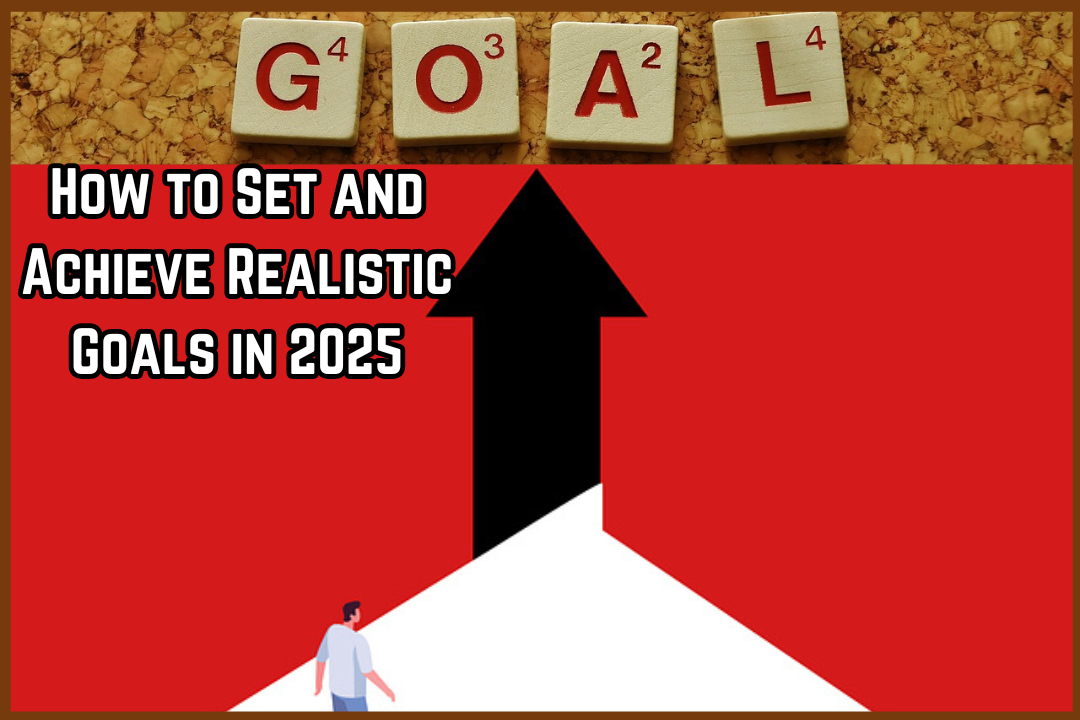How to Set and Achieve Realistic Goals in 2025?
Setting and achieving realistic goals is a key factor in personal development, productivity, and overall success. But it’s not just about dreaming big—it’s about creating goals that are practical, achievable, and tailored to your unique circumstances. Whether it’s advancing your career, improving your health, or learning a new skill, setting realistic goals ensures that you’re moving in the right direction, at a pace that works for you.
This article will guide you through the process of setting and achieving realistic goals, with tips, actionable steps, and strategies that will keep you motivated and focused. By the end, you’ll be equipped to set goals that are not only meaningful but also within your reach.
Why Setting Realistic Goals Matters?
Setting realistic goals is crucial for long-term success. Unrealistic goals often lead to frustration, stress, and eventually burnout. When goals are too lofty, it’s easy to feel defeated when progress is slow or when setbacks occur. On the other hand, realistic goals provide a balanced challenge, motivate you, and give you a clear sense of direction.
Benefits of Setting Realistic Goals:
- Increased Motivation: Realistic goals keep you motivated because they feel achievable.
- Clear Focus: They allow you to focus on what truly matters, reducing distractions.
- Steady Progress: Small, achievable goals lead to incremental progress, which compounds over time.
- Sense of Accomplishment: As you reach your milestones, you’ll experience a sense of success, reinforcing positive habits.
2. Understanding Your Starting Point
Before setting goals, it’s important to assess where you currently stand. Understanding your strengths, weaknesses, available resources, and time constraints will help you set goals that are realistic for your situation.
- Assess Your Strengths and Weaknesses: Are you great at time management but struggle with staying consistent? Understanding your strengths and areas for improvement helps you set goals that play to your advantages.
- Evaluate Available Resources: Do you have the tools, knowledge, and support you need to achieve your goal? Understanding your resources ensures you don’t set yourself up for failure.
- Time Constraints: Be realistic about how much time you can commit. Are you aiming to achieve something while balancing work, family, or other responsibilities? Setting timeframes that suit your schedule is essential.
3. SMART Goals: The Foundation for Success
A popular framework for setting achievable goals is the SMART method. SMART stands for Specific, Measurable, Achievable, Relevant, and Time-bound. It ensures that your goals are well-defined and structured.
| SMART Criteria | Description |
|---|---|
| Specific | Your goal should be clear and specific, not vague. |
| Measurable | You should be able to measure your progress (e.g., increase sales by 20%). |
| Achievable | Set a goal that is realistic given your current situation. |
| Relevant | Make sure your goal aligns with your overall values and long-term objectives. |
| Time-bound | Set a realistic deadline for when you want to achieve your goal. |
Example:
Instead of saying “I want to get fit,” a SMART goal would be: “I will exercise for 30 minutes, five days a week, for the next three months.”
4. Break Down Your Goals into Smaller Tasks
When you set a big goal, it can feel overwhelming. Breaking it down into smaller, manageable tasks makes the goal feel less daunting and allows you to focus on taking small steps each day.
Example:
Goal: “I want to write a book.”
- Breakdown:
- Write 500 words daily.
- Edit one chapter each week.
- Research for 30 minutes each day.
The Power of Small Tasks:
- Helps you avoid procrastination.
- Provides a clear roadmap.
- Offers regular milestones to celebrate.
5. Set Achievable Deadlines
Deadlines are essential in maintaining focus and momentum. When you set deadlines for each of your smaller tasks, it becomes easier to stay on track and avoid putting things off.
Tips for Setting Deadlines:
- Be realistic about the time needed for each task. Don’t rush.
- Allow some flexibility in case of unexpected events.
- Set specific deadlines for each task, not just the overall goal.
For example, if your goal is to save $1,000 in three months, break it down into monthly and weekly targets:
- Monthly Goal: Save $333.
- Weekly Goal: Save approximately $84.
6. Tracking Progress and Staying Accountable
One of the key factors in achieving goals is tracking your progress regularly. It helps you stay on course and adjust your approach if needed.
Methods to Track Progress:
- Use a Journal: Write down your daily or weekly goals and monitor your achievements.
- Apps and Tools: Utilize apps like Trello, Google Keep, or Todoist to track tasks and deadlines.
- Progress Charts: Create visual progress trackers (like a habit tracker or a milestone chart) to see how far you’ve come.
Accountability:
- Tell Someone: Share your goals with a friend or mentor to create a sense of accountability.
- Join a Group: Find a community of like-minded people who are working toward similar goals.
7. Flexibility and Adjusting Goals
Life is unpredictable. Sometimes, things don’t go as planned. Being flexible allows you to adjust your goals when necessary without losing sight of the bigger picture.
- Reevaluate Your Goals: If you find your goal is no longer realistic due to new circumstances, adjust it to fit your new reality.
- Adjust Deadlines: Sometimes deadlines may need to be extended, but always ensure you’re still making progress.
8. Overcoming Obstacles and Staying Motivated
On the path to achieving your goals, you will face challenges. The key is not to give up but to navigate through obstacles and keep moving forward.
Common Obstacles:
- Lack of Time: Find ways to prioritize your goals within your existing schedule.
- Lack of Motivation: Remind yourself of why you set the goal in the first place. Revisit the benefits and outcomes.
- External Factors: Life events or unexpected changes may impact your progress, but you can always adjust.
Tips for Staying Motivated:
- Visualize Success: Imagine the satisfaction of achieving your goal. Visualization can fuel motivation.
- Reward Yourself: Celebrate your small wins to stay motivated.
- Stay Positive: Maintain a positive mindset and focus on solutions, not problems.
9. Celebrate Small Wins
One of the most motivating aspects of goal setting is celebrating progress along the way. Small victories add up, and they give you the energy to continue pushing forward.
How to Celebrate:
- Treat Yourself: After achieving a milestone, reward yourself with something you enjoy.
- Reflect on Achievements: Take time to appreciate your efforts and reflect on what you’ve accomplished.
10. Learn from Failure
Failure is often seen as a negative outcome, but in reality, it’s an opportunity to learn and grow. If things don’t go as planned, reflect on what went wrong, adjust your approach, and keep moving forward.
How to Learn from Failure:
- Identify Mistakes: Look at where things didn’t go as planned and analyze why.
- Make Adjustments: Change your strategy or approach based on what you’ve learned.
- Don’t Get Discouraged: Every failure is a step toward success. Keep your eyes on the bigger picture.
11. Conclusion
Setting realistic goals is an essential part of achieving success in any area of your life. By following the steps outlined above—such as making goals specific, breaking them into manageable tasks, setting deadlines, tracking progress, and adjusting as needed—you can create a path that leads to success. Remember, the key is consistency and flexibility. Goals are not about perfection, but about continuous progress toward what matters most to you.
FAQs
1. How do I know if my goals are realistic?
To determine if a goal is realistic, evaluate your current abilities, resources, and the time you have available. Consider if the goal can be achieved within those parameters without compromising your well-being.
2. What should I do if I feel overwhelmed by my goals?
If you feel overwhelmed, break your goals down into smaller tasks, and focus on one step at a time. Prioritize your tasks and be kind to yourself if things take longer than expected.
3. How can I stay motivated when progress seems slow?
Focus on the small wins, track your progress, and remind yourself why you set the goal in the first place. Regularly revisit your motivation and adjust your plan if necessary.
4. Can I adjust my goals as I go along?
Yes! It’s important to be flexible. If your circumstances change or you find a better approach, adjusting your goals or deadlines is completely fine.
5. How do I handle setbacks?
Setbacks are normal. View them as opportunities to learn, adjust your strategy, and keep going. Persistence is key to achieving long-term success.







I very delighted to find this internet site on bing, just what I was searching for as well saved to fav
Your article helped me a lot, is there any more related content? Thanks! https://www.binance.com/register?ref=IHJUI7TF